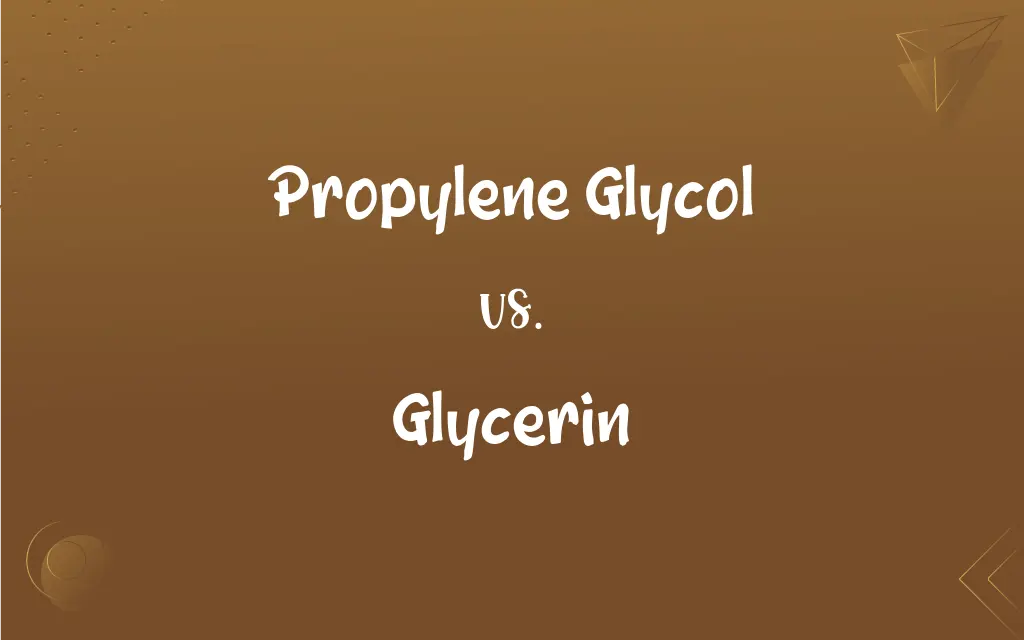Propylene Glycol vs. Glycerin: What's the Difference?
Edited by Aimie Carlson || By Janet White || Published on December 31, 2023
Propylene Glycol is a synthetic liquid substance that absorbs water, used in food processing and as a solvent. Glycerin is a natural, sweet-tasting compound used in foods, cosmetics, and pharmaceuticals for its moisturizing properties.

Key Differences
Propylene glycol is a synthetic, colorless, odorless, and tasteless liquid used in various industrial and pharmaceutical applications. It is known for its ability to absorb water. Glycerin, also known as glycerol, is a natural compound, slightly sweet in taste, and is used extensively in food, cosmetics, and pharmaceuticals for its excellent moisturizing properties.
In the food industry, propylene glycol is used as a food additive to retain moisture and enhance flavors. In contrast, glycerin is utilized for its sweetness and texture-enhancing properties, often in baked goods and confections.
Propylene glycol is also used in antifreeze and de-icing solutions due to its low freezing point. Glycerin, however, is known for its skin-soothing and hydrating qualities, making it a popular ingredient in skincare and cosmetic products.
In the pharmaceutical industry, propylene glycol serves as a solvent in oral, injectable, and topical medications. Glycerin is used in pharmaceuticals as a sweetening agent, laxative, and to improve smoothness and lubrication in certain medications.
Environmental and health impacts of propylene glycol are subject to ongoing research, with some concerns about its synthetic nature. Glycerin, being a natural product, is generally considered safe and is often preferred in natural and organic products.
ADVERTISEMENT
Comparison Chart
Source
Synthetic
Natural
Taste
Odorless and tasteless
Slightly sweet
Main Uses
Industrial, food additive, pharmaceutical solvent
Foods, cosmetics, pharmaceuticals, moisturizer
Properties
Water-absorbing, low freezing point
Moisturizing, skin-soothing, sweetening
Health and Environmental Impact
Under research, concerns in high doses
Generally considered safe and less controversial
ADVERTISEMENT
Propylene Glycol and Glycerin Definitions
Propylene Glycol
Employed in antifreeze and de-icing solutions.
Propylene glycol is effective in preventing freezing in car radiators.
Glycerin
Popular in skincare for its hydrating qualities.
Many facial cleansers contain glycerin to prevent skin dryness.
Propylene Glycol
A synthetic liquid that absorbs water.
Propylene glycol is used in many moisturizers to enhance hydration.
Glycerin
A natural compound with moisturizing properties.
Glycerin is added to lotions for its ability to retain skin moisture.
Propylene Glycol
Used as a food additive to retain moisture.
Propylene glycol helps keep packaged foods fresh and moist.
Glycerin
Used in foods for sweetness and texture.
Glycerin is a common ingredient in soft candies and baked goods.
Propylene Glycol
Used as a solvent in food and pharmaceuticals.
Propylene glycol is a common ingredient in flavored liquid medications.
Glycerin
Used as a natural laxative in medicinal applications.
Glycerin suppositories are used to treat occasional constipation.
Propylene Glycol
It is colorless, odorless, and tasteless.
Due to its lack of taste, propylene glycol is ideal for use in food processing.
Glycerin
Employed in pharmaceuticals as a sweetener and lubricant.
Glycerin is used in cough syrups for its sweet taste and soothing texture.
Glycerin
Glycerol or a preparation of glycerol.
Glycerin
(organic compound) glycerine.
Glycerin
An oily, viscous liquid, C3H5(OH)3, colorless and odorless, and with a hot, sweetish taste, existing in the natural fats and oils as the base, combined with various acids, as oleic, margaric, stearic, and palmitic. It may be obtained by saponification of fats and oils. It is a triatomic alcohol, and hence is also called glycerol. See Note under Gelatin.
Glycerin
A sweet syrupy trihydroxy alcohol obtained by saponification of fats and oils
FAQs
Is glycerin natural or synthetic?
Glycerin is a natural compound.
Can propylene glycol be used in food?
Yes, as a food additive for moisture retention and flavor enhancement.
Is propylene glycol safe for skincare?
It is used in skincare, but its safety is debated, especially in sensitive skin types.
What is propylene glycol primarily used for?
Used in industrial applications, food processing, and as a pharmaceutical solvent.
How is glycerin used in pharmaceuticals?
As a sweetener, lubricant, and in laxatives.
Why is glycerin used in baked goods?
For its moisture-retaining properties and sweetness.
What are the cosmetic uses of glycerin?
Glycerin is used for its moisturizing properties in lotions and creams.
Is glycerin edible?
Yes, it's safe to consume in food products.
What are the health effects of propylene glycol?
Generally safe in small amounts but can be concerning in high doses.
Can propylene glycol be found in antifreeze?
Yes, it's used in antifreeze and de-icing solutions.
Is propylene glycol natural?
No, it is a synthetic substance.
Are there any environmental concerns with propylene glycol?
Its environmental impact is under research, with some concerns in large quantities.
Can glycerin be used as a laxative?
Yes, in the form of suppositories for constipation.
Can glycerin be used in hair care products?
Yes, for its hydrating effects on hair.
Is propylene glycol used in medications?
Yes, as a solvent in various formulations.
What makes glycerin suitable for pharmaceutical use?
Its sweet taste and lubricating properties.
Does propylene glycol have a taste?
It is odorless and tasteless.
Is glycerin suitable for all skin types?
Yes, it's typically safe for most skin types, including sensitive skin.
What is the difference in the safety profile of propylene glycol and glycerin?
Glycerin is generally considered safer and less controversial.
How does glycerin benefit the skin?
It helps to hydrate and soothe the skin.
About Author
Written by
Janet WhiteJanet White has been an esteemed writer and blogger for Difference Wiki. Holding a Master's degree in Science and Medical Journalism from the prestigious Boston University, she has consistently demonstrated her expertise and passion for her field. When she's not immersed in her work, Janet relishes her time exercising, delving into a good book, and cherishing moments with friends and family.
Edited by
Aimie CarlsonAimie Carlson, holding a master's degree in English literature, is a fervent English language enthusiast. She lends her writing talents to Difference Wiki, a prominent website that specializes in comparisons, offering readers insightful analyses that both captivate and inform.































































